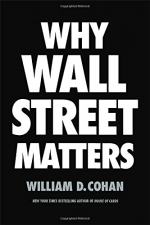|
This section contains 302 words (approx. 1 page at 400 words per page) |

|
Why Wall Street Matters Summary & Study Guide Description
Why Wall Street Matters Summary & Study Guide includes comprehensive information and analysis to help you understand the book. This study guide contains the following sections:
This detailed literature summary also contains Topics for Discussion on Why Wall Street Matters by William D. Cohan.
The following version of this book was used to create this study guide: Cohan. William D. Why Wall Street Matters. Random House, 2017.
Why Wall Street Matters by William D. Cohan is primarily an argument for the essentiality of the financial and banking system, known colloquially as Wall Street, in American life. The author responds to the broad public view that Wall Street is driven by greed and benefits wealthy investors at the expense of ordinary Americans and the stability of the national economy. In doing so, Cohan directly criticizes modern politicians, most notably Senators Bernie Sanders and Elizabeth Warren, as misguided in their disdain for Wall Street and calls for aggressive regulation. Their views, he argues, mirror a flawed public consensus that views Wall Street as inherently harmful and seeks to punish it for perceived crimes. In making his arguments, Cohan draws on the history of the system, beginning with the role it played in the creation of the United States, through the founding of the Federal Reserve and the Great Depression, to the 2008 economic crisis and the ongoing debate about a proper response. He notes the important role Wall Street has played in building the U.S. economy and praises leaders whom he believes understood that importance and sought to strengthen the system.
Cohan does acknowledge that Wall Street, in its current form, is flawed. Investors make financial decisions using other people’s money, allowing them to take on excessive risk without being personally responsible for losses. This perverse incentive, he argues, began when investment banks became publicly traded entities. To solve this problem, he advocates making Wall Street executives personally liable if their firms fail. He believes this system is vastly preferable to the current regulatory framework, under which government officials closely monitor the activities of all banks.
Read more from the Study Guide
|
This section contains 302 words (approx. 1 page at 400 words per page) |

|



